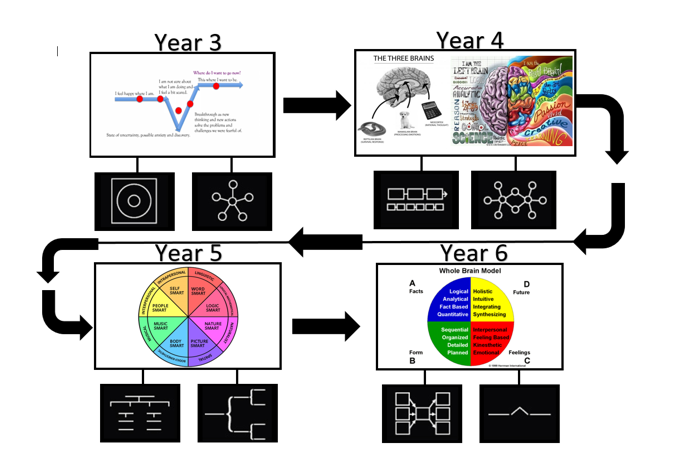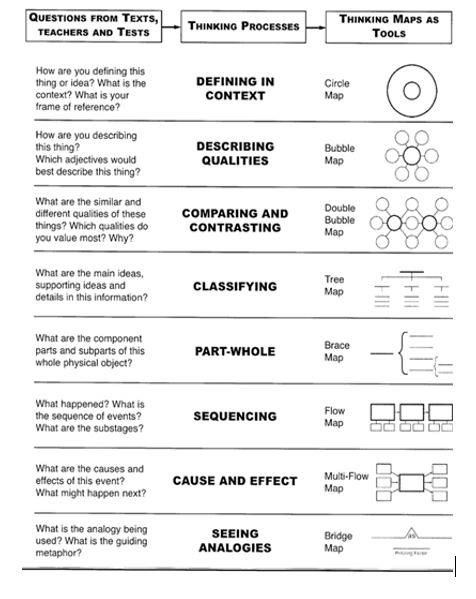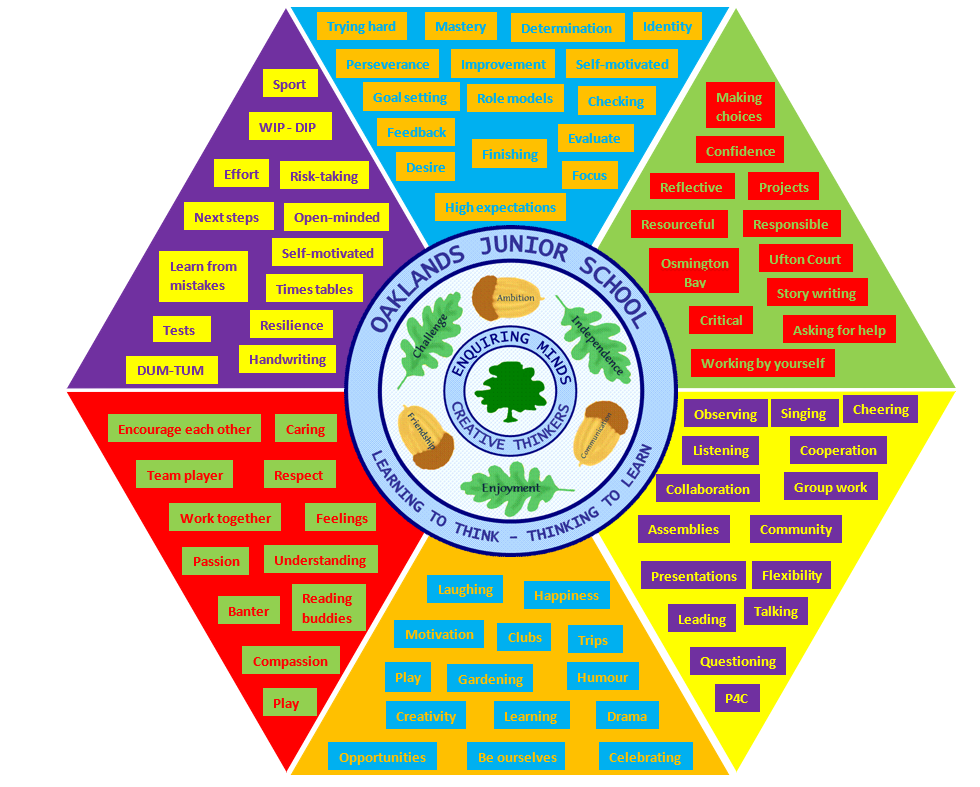Intent
Thinking is at the core of education at Oaklands Junior School and, as an accredited ‘Thinking School’, the practice of thinking underpins our entire educational approach. As a school we aim to develop thinking and reasoning skills to enhance self-esteem, promote collaboration and prepare children to become lifelong learners.
At Oaklands Junior School, we value our Oaklands’ Mindset that permeates everything we do. Our whole school community will:
- Challenge self and others to reach their full potential
- Foster determination and resilience in working towards our Ambition
- Encourage greater confidence to achieve Independence
- Value Friendship that shows respect and compassion
- Promote happiness and motivation to succeed through Enjoyment
- Develop Communication through collaboration and co-operation
Through exposure to a range of thinking tools and opportunities, including Thinking Maps, Thinking Families and P4C, children learn the value of knowledge, the skills to develop ideas and that their ideas have value while recognising the value of the ideas of others. They gain the confidence to become ambitious in their endeavours and the resilience to deal positively with challenge.
By the end of year 6, the children will be independent and co-operative learners, taking responsibility for their own learning and recognising the skills needed alongside a knowledge-based curriculum to achieve as highly as possible through the selection and application of thinking skills and tools appropriate to the task.
Implementation
Thinking Schools
A Thinking School is one where thinking underpins learning; where thinking skills and strategies are taught explicitly and are then used to develop a deeper understanding of the curriculum.
Children are encouraged to become more independent and co-operative learners, taking responsibility for their own learning and recognising the skills needed alongside a knowledge-based curriculum to achieve as highly as possible. We are an accredited Thinking School and are a Thinking Schools Network Hub School.
Thinking Journey
In order to develop each child’s understanding of their own learning, Oaklands has developed a Learning Journey that builds each year on previous learning while giving children the opportunity to explore their own developing understanding of themselves as a learner. The process is shown in the diagram below.
In each year group, specific knowledge is taught to help children deal with the inherent difficulties in learning by helping them understand the processes involved.
In year 3, children are taught about the Learning Line, which introduces the concept of ‘the pit’, which is when we first become aware that we can’t do something. Children are encouraged to use this diagram to explain where they are in their learning and this tool is used in self-evaluation in maths lessons to reinforce and embed the process. BY THE TIME CHILDREN LEAVE THEY CAN ARTICULATE UNCONCIOUS COMPETENCE ETC
In year 4, children learn about the brain. They learn about the Triune brain and the impact that external factors can have on their learning. They are taught that higher level thinking depends on the Reptilian and Mammalian brain being balanced and begin to understand how they can ensure this happens, for example by getting enough sleep, feeling safe or going to the toilet.
In year 5, the focus become more individualised as children complete a questionnaire that helps them identify their strengths in learning through the concept of Multiple Intelligences. By having a firmer understanding of themselves and their strengths, children are able to access these strengths to support in areas of difficulty, for example a child with strong musical intelligence may find it useful to use music and rhythm to learn times tables facts.
By year 6, children have embedded the understanding from previous years and are supported to analyse not only their brain type but understand how differing brain types can be both beneficial and detrimental to positive outcomes. This is done using Hermann’s Brain Model, which suggests 4 quadrants to each brain, with every individual having a unique balance between the four areas. These areas are Logic (Blue brain), Organisation (Green brain), Creativity (Yellow brain) and Emotion (Red brain). Children complete an assessment that helps identify their own brain according to the model and they are then supported to share this with their peers so that they understand how each person may respond differently to a challenge and be prepared to work together by using other’s strengths to match their own areas in need of support.

Thinking Tools
At Oaklands Junior School, we use a range of Thinking Tools to organise our thoughts and support children to develop flexibility and rigour in their everyday thinking. These tools are used throughout the curriculum and therefore a common language of thinking is developed which children use throughout their time and Oaklands and beyond.
Thinking Maps
Thinking Maps, developed by Dr David Hyerle, are a set of eight visual tools to teach universal thinking processes. They provide a common visual thinking language and are used for the explicit teaching of cognitive skills that can be transferred into all curriculum areas and with all age groups.
Thinking Maps are well tried and tested and have been shown to be effective in teaching young people how to develop and use a range of thinking processes. They extend the quality of thinking and help to create effective learners.

P4C
Children have embraced the use of philosophy in the classroom. They know that their ideas and the ideas of others have value and that there is not always a right or wrong answer. P4C means that children gain the confidence to have an opinion, give reasons for it, ask questions while all the time learning through discussion.
At Oaklands Junior School, we use the 4C thinking model as a focus for our P4C enquiries (Caring, Collaborative, creative and critical thinking). Classes have stand-alone enquiries, based on a stimulus, as well as in lessons that are based on a topic that we are studying as part of the new National Curriculum. Paula Jones is our P4C leader and has undertaken further training to support this role.
Box Success Criteria
Writing is your best thinking written down
Used to help in the initial stages of planning writing, the box, or expanding, success criteria model helps children to develop their understanding of audience and purpose, linking this to language and structure chosen explicitly to address success criteria raised in the previous stage. This helps children to develop exciting and engaging pieces that explore the effect of language on the reader.
Thinking Families
Children are placed in Thinking Families, which contain children from all year groups. Children remain in the same family throughout their time at Oaklands Junior School. We run a Thinking Families session every term, building to the Thinking Families Day in the summer term, where we have a specific focus that is approached in a range of styles to engage all children in their thinking and learning.
Myself as a Learner (MALS)
Children are supported to complete MALS surveys online at various points throughout their time at Oaklands Junior School. These surveys, created in school, help children to identify their own status as a learner and for staff to understand each child in much greater detail, allowing teaching and learning to become increasingly personalized.
The Curriculum and Thinking
In order for the Thinking Schools approach to be most effective, it is imperative that it is embedded within the curriculum as well as being an explicit part of our ethos. Therefore, the planning and delivery of the entire curriculum is based around Thinking, and more specifically Bloom’s Taxonomy of hierarchical cognitive skills.
Over the past 5 years, staff have taken on responsibility for remodelling the entire curriculum at Oaklands Junior School to develop a clear progression of knowledge and skills. This development was as a direct result of training attended by members of the SLT on 21st November 2019 and provided by Chris Quigley via Wokingham Borough Council.
Taking the National Curriculum as the basis, staff have identified Key Concepts within each subject. These have been further clarified through the use of verbs which identify key skills within that Key Concept. A progression of these key skills uses milestones at year 2, Year 4 and Year 6 to show progress within the Key Concept and, when combined, within the subject as a whole.
Bloom’s Taxonomy is particularly effective in this regard as it is based on Knowledge and Understanding, much of which is identified in the National Curriculum. However, Bloom’s Taxonomy provides a framework for developing beyond the requirements of the knowledge-based curriculum into higher order thinking that promotes a lifelong love of learning while developing the attitudes necessary for continued success in life.
The Oaklands’ Mindset
What is it?
The Oaklands Mindset is our ethos – it attempts to visualise attitudes, activities and learning at Oaklands Junior School.
How was it created?
The Oaklands Mindset was created by the Oaklands Junior School community: children, parents and staff.
It is always evolving and new ideas are welcomed.
Why was it created?
The Oaklands Mindset was created to share our ethos with the School Community and beyond. It is unique to Oaklands Junior School.

Impact
The purpose of education is to prepare for the next stage in life. In order to be ready for the move to Key Stage 3, by the time children leave Oaklands Junior School they will be able to independently apply the knowledge and skills necessary for a successful next step in education.
| Intent | Impact – by the end of year 6 children will be able to: |
| Challenge self and others to reach their full potential | Accept different challenges and have the tools and attitudes necessary to deal with them |
| Foster determination and resilience in working towards our Ambition | Set themselves aspirational targets, work hard towards achieving them and be able to evaluate their success |
| Encourage greater confidence to achieve Independence | Make increasingly important decisions for themselves and take responsibility for their own organisation |
| Value Friendship that shows respect and compassion | Work and play cooperatively and collaboratively with others from both their peer group and beyond |
| Promote happiness and motivation to succeed through Enjoyment | Find pleasure in even the most mundane of tasks through celebrating effort as well as success |
| Develop Communication through collaboration and co-operation | Use a range of tools and strategies to communicate effectively with others |
Through exposure to a range of thinking tools and opportunities, including Thinking Maps, Thinking Families and P4C, children will appreciate the value of knowledge, have the skills to develop ideas and understand that their ideas have value while recognising the value of the ideas of others. They will have the confidence to become ambitious in their endeavours and the resilience to deal positively with challenge.
A Thinking Schools approach is particularly supportive of those children with Special Educational Needs. The range of tools used help children to personalise their learning journey, to set targets that they can understand, achieve and develop and it creates a learning atmosphere that allows success to be defined in myriad ways, thus ensuring that all children can be successful in their time at Oaklands Junior School.
Furthermore, one of the key messages to come out of the Covid pandemic was the importance of metacognition in supporting children to minimise the effects of school closures on their progress. Metacognition is at the heart of a Thinking Schools approach and therefore children will already have been developing the skills needed to overcome any difficulties arising from recent disruption and those joining us since the pandemic are given every opportunity to thrive.
By the end of year 6, the children will be independent and co-operative learners, taking responsibility for their own learning and recognising the skills needed alongside a knowledge-based curriculum to achieve as highly as possible through the selection and application of thinking skills and tools appropriate to the task.
The Impact of Thinking at Oaklands Junior School can be gauged in several ways.
Firstly, it will be evident in the work children record that they can use the Thinking Tools effectively.
Secondly, staff, children and other adults will see how children enact the Oaklands Mindset through their actions within and beyond school.
Thirdly, children will have the chance to share their own views through the MALS surveys and, in year 6, through the Leaver’s survey.
Finally, feedback from parents and staff at their Senior Schools provide a picture of how children are managing their next step in the education system.
Ofsted April 2022
A welcome addition in evaluating Impact was the recent Ofsted inspection (April 26th-27th 2022). Many areas of the ‘Thinking Schools’ approach were commented on in the report:
What is it like to attend this school?
Pupils enjoy the subjects they study, thinking deeply about their learning. This reflects the school’s strong focus on ‘Learning to think – Thinking to learn’.
Pupils speak enthusiastically about their learning. They especially like how teachers promote discussions in lessons. Pupils say this helps them develop their thinking and understanding.
What does the school do well?
Leaders are refining their ambitious curriculum for pupils. The ‘Thinking Curriculum’ focuses on developing thinking skills to enable pupils to learn something in one subject and then apply that knowledge in another.
Most impressively, they support one another as good citizens of the school. This is the embodiment of ‘Oaklands’ Mindset’, promoting friendship, community and enjoyment.
Next Steps
Sharing Thinking Schools approach with more schools through hosting ‘Thinking Meets’, sharing ideas with colleagues and taking opportunities whenever available to promote the Thinking Schools ethos, such as lecturing at the Wellington Festival of Education.
